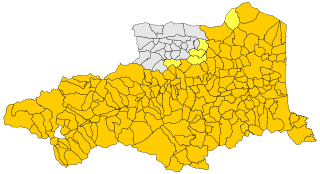Northern Catalan
| Northern Catalan | |
|---|---|
| Roussillonese | |
| català septentrional rossellonès | |
 Street sign in Formiguera. | |
| Native to | France |
| Region | Northern Catalonia |
| Ethnicity | Catalans |
Early forms | |
| Catalan alphabet | |
| Language codes | |
| ISO 639-3 | – |
| IETF | ca-FR |
 The areas of French Oriental Pyrenees where Catalan is spoken in ■ orange. | |
| Catalan / Valencian cultural domain |
|---|
 |
Northern Catalan (Catalan: català septentrional),[a] also known as Rossellonese (rossellonès),[b] is a Catalan dialect mostly spoken in Northern Catalonia (roughly corresponding with the region of Roussillon), but also extending in the northeast part of Southern Catalonia in a transition zone with Central Catalan.[1][2] All speakers of Catalan from North Catalonia are at least natively bilingual with French.[3]
Phonetics[edit]
Phonetic features of Northern Catalan include:
- It has only five stressed vowels, the smallest number of any Catalan dialect: /i, e, a, o, u/. In some local varieties /y, ø/ can also be found.
- Like other Eastern Catalan dialects, unstressed /a/ and /e/ are realized as schwa [ə], and [ʊ] substitutes unstressed /o/.
- There are some instances of historic stressed /o/ that has changed to /u/: Canigó > Canigú.
- As in the Balearic dialects, final a [ə] is not pronounced in words ending with ia if the stress is before the penultimate syllable.
Morphology[edit]
Some subdialects keep the singular masculine definite article lo, as in North-Western Catalan and many varieties of Occitan.
Northern Catalan has a large body of words imported from French and Occitan.[4] It also features some grammatical forms and structures that are typical of Occitan, such as the use of a lone post-verbal pas, rather than a lone preverbal no to express basic negation (Northern Catalan canti pas vs. Central Catalan no canto, 'I don't sing' or 'I'm not singing'); pas is also used in some other Catalan dialects for emphasis but always with no before the verb (Central Catalan no canto pas, 'I do not sing' or 'I am not singing').
Notes[edit]
- ^ Catalan pronunciation: [kətəˈla səptəntɾiuˈnal]
- ^ Catalan pronunciation: [rusəʎuˈnɛs]
References[edit]
- ^ Argenter, Joan A.; Lüdtke, Jens (2020-04-06). Manual of Catalan Linguistics. de Gruyter. pp. 382–383. ISBN 978-3-11-045040-8.
- ^ Feldhausen, Ingo (2010-11-25). Sentential Form and Prosodic Structure of Catalan. John Benjamins Publishing. p. 5. ISBN 978-90-272-8759-5.
- ^ Kircher, Ruth; Zipp, Lena (2022-07-07). Research Methods in Language Attitudes. Cambridge University Press. p. 342. ISBN 978-1-108-49117-4.
- ^ Hawkey, James (2018-04-12). Language Attitudes and Minority Rights: The Case of Catalan in France. Springer. pp. 29–37. ISBN 978-3-319-74597-8.

